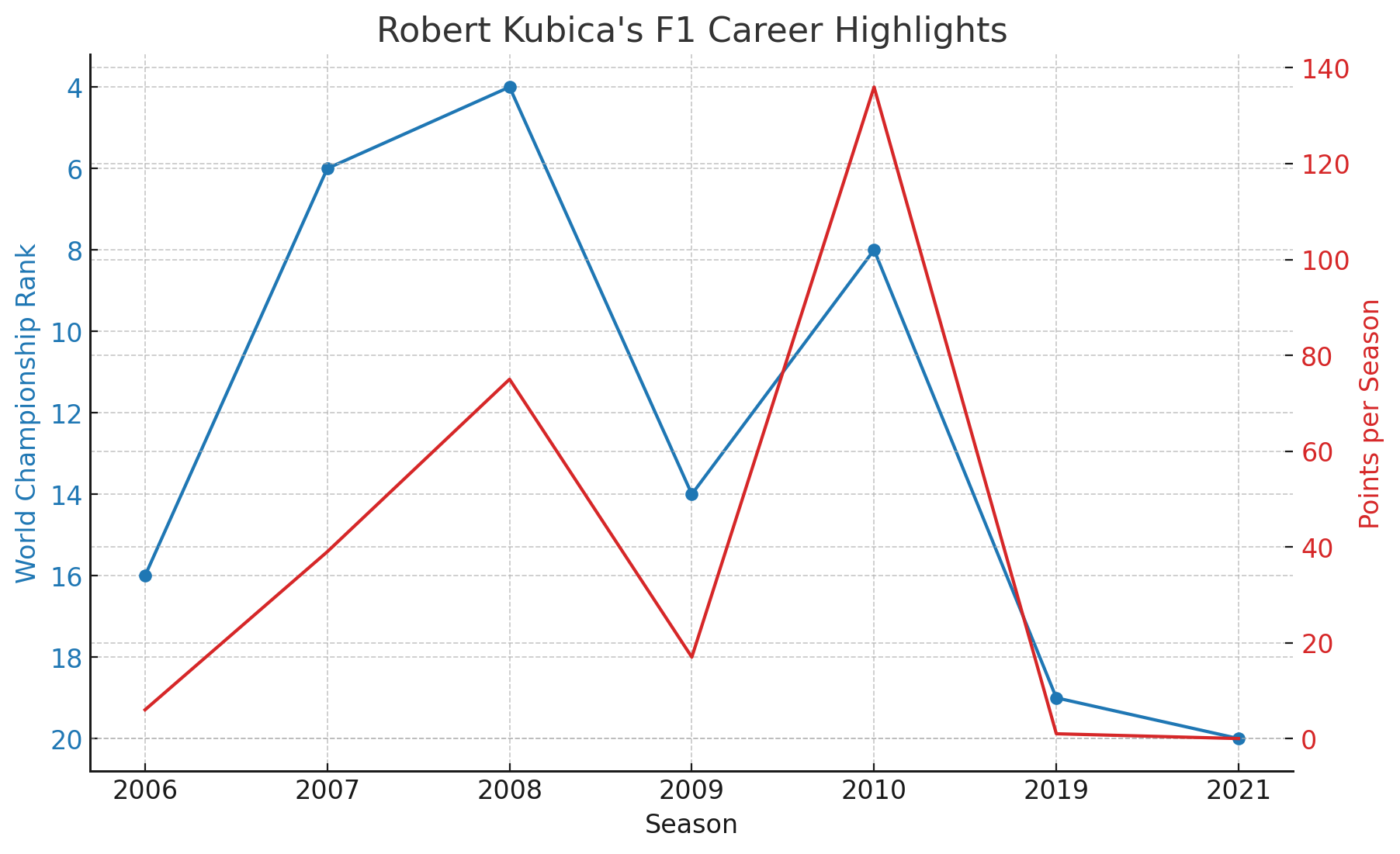Robert Józef Kubica
Robert Józef Kubica: From Karting Prodigy to F1 Phenomenon and Beyond
The Early Years: A Karting Sensation
Born on December 7, 1984, in Kraków, Poland, Robert Kubica’s journey into motorsports began at a young age, dominating the karting circuits. With six national championships under his belt, Kubica ventured into Italy in 1998, swiftly making his mark by becoming the first non-Italian to win the Italian Karting Championship. His success didn’t stop there; he also clinched the vice-champion title in the European Karting Championship. The year 1999 saw Kubica repeating his success in Italy and becoming the first non-German to win the German Formula 3 Championship, showcasing his burgeoning talent and versatility on the track.
Formula Renault and Formula 3 Ascendancy
Transitioning to car racing, Kubica tackled the Formula Renault 2000 series in 2001, competing in both the Italian championships and the EuroCup. By 2002, he was the vice-champion of Italy, amassing 188 points and three victories. His foray into the European Formula 3 Championship in 2003 was marked by a victorious debut at the Norisring, despite missing early races due to a road accident. Though he couldn’t replicate his initial success throughout the season, Kubica triumphed at the Masters of Sardinia, highlighting his raw speed and racing intellect.
Robert Józef Kubica: Summary of Career Statistics
- Birthdate: December 7, 1984
- Nationality: Polish
- First Grand Prix: Hungary 2006
- Last Grand Prix: Italy 2021
- Total F1 Seasons: 10
- Teams: 4 different constructors
- Engine Builders: 4 different engine builders
- Car Models: 10 models driven
- Number of Grand Prix: 99 starts
- Non-Starts: 10
- Best World Championship Finish: 4th in 2008
- Total Podiums: 12 (12.12% podium rate)
- Victories: 1 (1.01% win rate)
- Pole Positions: 1 (1.01% pole position rate)
- Fastest Laps: 1 (1.01% fastest lap rate)
- Total Points: 274
- Points per Grand Prix: 2.77
- Average Points per Season: 39.14
- Total Laps Led: 74
- Total KM Led: 337 km
- Total Laps Raced: 5,505
- Total KM Raced: 27,650 km
- Retirements: 14 (14.14% retirement rate)
- Average Starting Grid Position: 10.18
- Average Finishing Position: 9.42
- Helmet Number: #88
- Non-World Championship Involvements: 18 events
Kubica’s career, marked by his resilience and skill, showcases a profound journey through Formula 1, rallying, and a notable comeback after a life-threatening accident. His stats reflect a racer who consistently punched above his weight, overcoming adversity to leave a lasting legacy in motorsports.

Robert Józef Kubica – Kubica’s World Championship ranking and points per season throughout his Formula 1 career. The blue line illustrates his ranking across different seasons, with an inverse axis to highlight lower (better) ranks as higher on the chart. The red line depicts the points he accumulated each season, showcasing his peak performance years and the fluctuations in his career.
The Leap to Formula 1
Kubica’s mastery in the World Series by Renault in 2005, garnished with four wins and both driver and team titles, set the stage for his Formula 1 entry. Despite testing for Renault, Kubica opted for a more prominent role elsewhere, leading to his signing as a test driver for BMW Sauber in 2006. His competitive debut came in the same year, immediately marking his presence with a point-scoring finish at the Hungarian Grand Prix, despite a subsequent disqualification.
Rising Through the Ranks in F1
2007 was a season of learning and close calls for Kubica, including a miraculous escape from a horrific crash at the Canadian Grand Prix. Returning stronger, he missed out on a maiden victory in China due to a gearbox failure. However, 2008 was Kubica’s standout year, achieving his first F1 victory in Canada and mounting a title challenge, ultimately finishing fourth in the championship standings.
A Career Halted by Injury
The 2009 season was a setback for Kubica and BMW, with the team’s performance dwindling. Moving to Renault in 2010, Kubica showcased his ability to lead a team, delivering consistent points finishes and podiums. However, a severe rally accident in 2011 sidelined him from Formula 1, marking a pause in his racing career due to significant injuries.
A Journey Through Recovery and Rallying
Kubica’s passion for motorsport saw him venturing into rallying during his recovery, winning several rally events and exploring a full-time shift to the World Rally Championship. Despite the challenges, Kubica’s resilience and determination exemplified his love for racing, regardless of the discipline.
The Return to Formula 1
Against all odds, Kubica made a remarkable return to Formula 1, participating in limited races for Williams in 2019 and Alfa Romeo in 2021, proving not just his undiminished skill but also his unparalleled fighting spirit.
Legacy and Beyond
Robert Kubica’s racing career is a narrative of triumph, tragedy, and tenacity. From his early days as a karting champion to his battle-hardened return to Formula 1, Kubica’s journey is a testament to his relentless pursuit of his passion, leaving an indelible mark on the world of motorsports. His story continues to inspire, demonstrating that resilience and determination can overcome the most daunting challenges.




